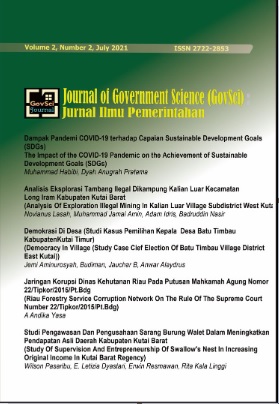Dampak pandemi COVID-19 terhadap capaian Sustainable Development Goals (SDGs) The impact of the COVID-19 pandemic on the Achievement of Sustainable Development Goals [SDGs]
Abstract
This study aims to analyze the impact of COVID-19 on the achievement of the Sustainable Development Goals (SDGs) in Indonesia. The sustainable development goals represent a global plan of action, approved by world leaders, intended to end poverty, reduce social inequality, and protect environment. These SDGs consist of 17 goals and 169 targets that are scheduled to be achieved by 2030, and Indonesia began implementing them in 2015. The method used in this study was a bibliometric and descriptive evaluative analysis, wherein data was collected by using the Publish or Perish application, and then processed with VOSviewer application software. Four indicators needed to be scrutinized, namely; (1) the socio-economic impact of COVID-19; (2) the impact of COVID-19 on sustainable development goals; (3) the new normal for the achievement of the SDGs; and (4) the financing of SDGs in a post-COVID period. The results of the study show that the socio-economic impact of the COVID-19 pandemic greatly influences SGDs. Cost is a crucial factor as pandemic’s cost is huge, and by all means has a direct impact on SGD efforts. To realize SGDs by 2030 would require governments around the world to improvise in dealing with it, and indeed implement a new normal in governance processes.
References
Badan Perencanaan Pembangunan Nasional (Bappenas). (2010). Laporan Pencapaian Tujuan Pembangunan Milenium di Indonesia 2014. Jakarta. Retrieved from https://www.bappenas.go.id/files/8613/5229/8462/1-laporan-pencapaian-tujuan-pembangunan-milenium-indonesia-2010201011181321170__20101223204310__2813__0.pdf
Badan Pusat Statistik. (2020a). Ekonomi Indonesia 2020 Turun sebesar 2,07 Persen (c-to-c). Retrieved from bps.go.id website: https://www.bps.go.id/pressrelease/2021/02/05/1811/ekonomi-indonesia-2020-turun-sebesar-2-07-persen--c-to-c-.html
Badan Pusat Statistik. (2020b). Persentase Penduduk Miskin September 2020 naik menjadi 10,19 persen. Retrieved from bps.go.id website: https://www.bps.go.id/pressrelease/2021/02/15/1851/persentase-penduduk-miskin-september-2020-naik-menjadi-10-19-persen.html
Badan Pusat Statistik. (2020c). Pertumbuhan Ekonomi Q4-2019 s.d. Q4-2020 (Y-on-Y) Menurut Lapangan Usaha. Retrieved from bps.go.id website: https://www.bps.go.id/website/materi_ind/materiBrsInd-20210205095341.pdf
Bank Indonesia. (2020). Pertumbuhan Ekonomi Indonesia Triwulan IV 2020 Melanjutkan Perbaikan. Retrieved from Bank Indonesia website: https://www.bi.go.id/id/edukasi/Documents/Infografis-Pertumbuhan-Ekonomi-Indonesia-Triwulan-IV-2020.pdf
Bank Indonesia. (2021). External Debt Statistics of Indonesia - April 2021. Retrieved from bi.go.id website: https://www.bi.go.id/en/statistik/ekonomi-keuangan/sulni/Pages/SULNI-April-2021.aspx
Eck, N. J. van, & Waltman, L. (2021). VOSviewer Manual. Netherlands. Retrieved from http://www.vosviewer.com/documentation/Manual_VOSviewer_1.6.1.pdf
Ihsanuddin. (2020). Fakta Lengkap Kasus Pertama Virus Corona di Indonesia. Retrieved from nasional.kompas.com website: https://nasional.kompas.com/read/2020/03/03/06314981/fakta-lengkap-kasus-pertama-virus-corona-di-indonesia?page=all
International NGO Forum on Indonesian Development. (2017). Masyarakat Sipil Indonesia & Pemerintah Dorong Percepatan Pembangunan Berkelanjutan.
Kementerian Kesehatan. (2020). Posisi Pencapaian MDG’S di Indonesia. Retrieved from Kementerian Kesehatan website: https://kespel.kemkes.go.id/news/news_public/detail/37
Kementerian Keuangan. (2020). Perubahan Postur dan Rincian APBN 2020 di Masa Pandemi Covid-19. Retrieved from anggaran.kemenkeu.go.id website: https://anggaran.kemenkeu.go.id/in/post/perubahan-postur-dan-rincian-apbn-2020-di-masa-pandemi-covid-19
Mahler, D. G., Lakner, C., Aguilar, R. A. C., & Wu, H. (2020). The Impact of COVID-19 (Coronavirus) on Global Poverty: Why Sub-Saharan Africa Might be the Region Hardest Hit.
Mutiarani, N. D., & Siswantoro, D. (2020). The Impact of Local Government Characteristics on the Accomplishment of Sustainable Development Goals (SDGs). Cogent Business and Management, 7(1). https://doi.org/10.1080/23311975.2020.1847751
Redclift, M. (2005). Sustainable Development (1987–2005): An Oxymoron Comes of Age. Sustainable Development, 13(4), 212–227. Retrieved from http://www.homepages.ucl.ac.uk/~ucessjb/S3 Reading/redclift 2005.pdf
Runde, D. F., Metzger, C., & Abdullah, H. F. (2020). Covid-19 Demands Innovative Ideas for Financing the SDGs. In Center for Strategic & International Studies Briefs. Washington, D.C. Retrieved from https://www.csis.org/analysis/covid-19-demands-innovative-ideas-financing-sdgs
Stern, D. I., Common, M. S., & Barbier, E. B. (1996). Economic Growth and Environmental Degradation: The Environmental Kuznets Curve and Sustainable Development. World Development, 24(7), 1151–1160. https://doi.org/10.1016/0305-750X(96)00032-0
Syarifuddin, T. I., Budiman, & Purwaningsih, T. (2021). Regional Head Communication Patterns on Social Media in Handling the Covid-19 Pandemic. IOP Conference Series: Earth and Environmental Science, 717(1). https://doi.org/10.1088/1755-1315/717/1/012020
United Nations. (1992). Agenda 21. Rio de Janerio. Retrieved from https://sustainabledevelopment.un.org/content/documents/Agenda21.pdf
United Nations. (2020a). Shared Responsibility, Global Solidarity: Responding to the Socio-economic Impacts of COVID-19. New York. Retrieved from https://www.un.org/sites/un2.un.org/files/sg_report_socio-economic_impact_of_covid19.pdf
United Nations. (2020b). World Economic Situation and Prospects as of mid-2021. New York. Retrieved from https://www.un.org/development/desa/dpad/wp-content/uploads/sites/45/publication/WESP2020_MYU_Report.pdf
Winck, B. (2020). The IMF Says its Forecast for the COVID-19 Recession Might Now be too Optimistic. Retrieved from weforum.org website: https://www.weforum.org/agenda/2020/04/imf-economy-coronavirus-covid-19-recession/
Xin Zhou, Moinuddin, M., & Li, Y. (2021). SDG Interlinkages Analysis & Visualisation Tool (V4.0). Kanagawa. Retrieved from https://sdginterlinkages.iges.jp/index.html
Yuan, M. (2021). Geographical Information Science for the United Nations’ 2030 Agenda for Sustainable Development. International Journal of Geographical Information Science, 35(1), 1–8. https://doi.org/10.1080/13658816.2020.1766244

